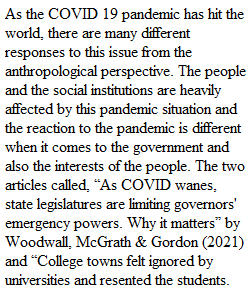


Q The objective of this Critical Reflection/Response is to critically reflect on Module 10's Lesson, and to respond to the following prompt. Background: In Module 10, we applied an holistic, anthropological perspective to consider forms of governmentality in American social institutions. The lessons and videos presented examples of institutional power over groups and individuals; they also highlighted collective and individual instances of negotiation/accommodation and resistance. These examples underscore challenges that binary oppositions and other oversimplified explanations present to researchers interested in understanding American institutions. Prompt: Using at least two credible* news media sources, you will conduct individual research on a current event or topic that could be analyzed using a framework of governmentality, negotiation/accommodation, and/or resistance. Describe the current event or topic from an anthropological perspective, then offer a brief analysis of governmentality and public response. Reputable news sources can be liberal or conservative, public or private, American or global. The onus of proof is upon you, the researcher, to demonstrate your sources' credibility. For full credit, make sure to double-check the CRR rubric, and incorporate at least 2 relevant conceptual frameworks in your response. Requirements: • complete original work • demonstrate your understanding of the Module 10 theme "Governmentality" by applying it to the current event or topic • incorporate an anthropological perspective and effectively utilize appropriate terms and concepts • identify at least two (2) elements of Module 10 that relate to the topic of your choice (for example, the Module readings, the linked articles, the PBS clips, YouTube film clips, Podcasts, and related articles) • write in clear and concise language, free of grammatical issues, stay within the word limit • properly cite (that is, give credit) the aforementioned news outlets and course elements The Instructional Assistants and I are looking for a good critical reflection, following the guidelines posted in Module 1. Instructions for submission: 1. Compose your reflection in a word document and save it so you don't lose your work. 2. Keep your reflection between 300 - 350 words. 3. Copy and paste your reflection here into Canvas, proofread it for spelling and grammar errors, then submit. Grading: The Grading Rubric for your Critical Reflection and Response assignments is available from the Canvas action menu. Grades will still be issued on a percentage basis using a letter grade. • A: 90-100% (Outstanding, excellent work. The student performs well above the minimum criteria.) • B: 80-89% (Good, impressive work. The student performs above the minimum criteria.) • C: 70-79% (Solid, college-level work. The student meets the criteria of the assignment.) • D: 60-69% (Below average work. The student fails to meet the minimum criteria.) • F: 59 and below (Sub-par work. The student fails to complete the assignment.)
View Related Questions